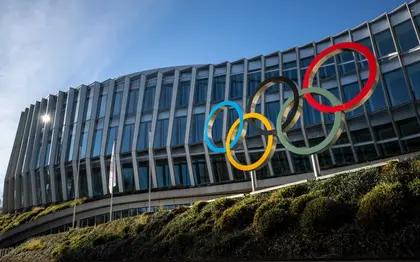Earlier this year, the International Olympic Committee (IOC) announced that Russian and Belarusian athletes would be allowed to compete at the 2024 Summer Olympic Games. The caveat was that these athletes must participate under a neutral banner. The IOC executive board later approved the decision in January.
Then, in March, the IOC ruled that Russian and Belarusian athletes would be allowed to “earn places in next year’s [Olympic Games].” In other words, these athletes could participate in qualification events. Should they succeed in the qualifiers, these athletes would be permitted to compete at next year’s Games.
JOIN US ON TELEGRAM
Follow our coverage of the war on the @Kyivpost_official.
Dozens of countries across the globe have condemned these decisions. Sports ministers and other government representatives have called on the IOC to reverse its decision, stating that the Russians and Belarusians should not be allowed to participate due to the ongoing Russian invasion of Ukraine.
For now, the IOC has ignored the concerns submitted by these countries. But tensions continue to rise between the IOC and numerous countries around the world. Seeing that these statements have gone unheard, dozens of countries across the globe are considering the possibility of boycotting next year’s competition.
“I think, that in the coming week, 40 countries will take a very firm and very clear stand against the inclusion of Russian and Belarusian athletes at the Olympics,” said Kamil Bortniczuk, Poland’s Minister of Sport and Tourism. “If we were to boycott the [2024 Summer Olympic] Games, the coalition we will be a part of will be broad enough to make holding [next year’s Olympic] Games pointless.”
The IOC has not changed its position, so the international coalition has now spoken out. On May 4, thirty-six countries from four continents issued a statement to the IOC that they “continue to oppose the participation of athletes from Russia and Belarus as neutrals in international sports competitions.”
The diverse group stated that it would continue to condemn the decision, saying that the globe cannot forget Russia’s ongoing aggression in Ukraine.
The collation maintains that “the Russian state, which has broken the Olympic Truce twice, must not be allowed to use sport to legitimize its barbaric and unprovoked invasion of Ukraine,” the statement read.
“The Belarusian state [should not] be able to use sports to legitimize its complicity in Russia’s war of aggression,” the statement said.
“If these issues are not addressed, [then the coalition] would expect the IOC to reconsider its approach.”
| Asia | Europe | North America | Oceania |
| Japan | Albania | Canada | Australia |
| South Korea | Austria | United States | New Zealand |
| Belgium | |||
| Bulgaria | |||
| Croatia | |||
| Cyprus | |||
| Czechia | |||
| Denmark | |||
| Estonia | |||
| Finland | |||
| France | |||
| Germany | |||
| Greece | |||
| Iceland | |||
| Ireland | |||
| Italy | |||
| Latvia | |||
| Liechtenstein | |||
| Lithuania | |||
| Luxembourg | |||
| Netherlands | |||
| Norway | |||
| Poland | |||
| Portugal | |||
| Slovakia | |||
| Slovenia | |||
| Spain | |||
| Sweden | |||
| Ukraine | |||
| United Kingdom |
Table: The 36 Countries Who Oppose Russian and Belarusian Athlete Participation at the 2024 Olympic Games
Now, the IOC must determine how it will proceed. The executive board said that it received the statement signed by these thirty-six countries, and that it would continue to monitor the situation.
But time is running out. The longer the IOC decides to ignore these pleas made by the international community, the more likely it will be that Russian and Belarusian athletes will be permitted to compete at next summer’s games.
In other words, while the IOC continues to state that it is monitoring the situation, and while the IOC receives additional statements and concerns issued by the international coalition, it appears that the IOC is disinterested in changing its stance on allowing Russians and Belarusians to compete as neutrals.
Should this occur, then this international coalition must proceed with its boycott. Russia and Belarus should not be rewarded for the ongoing invasion of Ukraine.
They must be punished for the atrocities committed, and this should include preventing their athletes from competing in next summer’s Olympic Games.
Sports are a luxury, not a right, and they should be treated as such. There should be no exceptions.
A boycott would also speak volumes. Some of the world’s wealthiest countries are part of the recently formed international coalition, meaning their lack of participation would result in hundreds of millions of dollars lost in revenue.
In addition, it is likely that international broadcasters would pull out of the competition, meaning the IOC would lose even more money.
Finally, some of the world’s most talented athletes would be missing from the competition. This would likely lead to decreased viewership across the globe. In other words, an international boycott would be catastrophic for the IOC.
Therefore, the IOC needs to determine how it will proceed. Will it pursue a policy of morals and ethics and remove Russian and Belarusian athletes from next year’s Olympic Games? Or will it risk a boycott and international embarrassment in exchange for greed? Time will tell.
Mark Temnycky is an accredited freelance journalist covering Eastern Europe and a nonresident fellow at the Atlantic Council’s Eurasia Center. He can be found on Twitter @MTemnycky
The views expressed in this opinion article are the author’s and not necessarily those of Kyiv Post.
You can also highlight the text and press Ctrl + Enter



